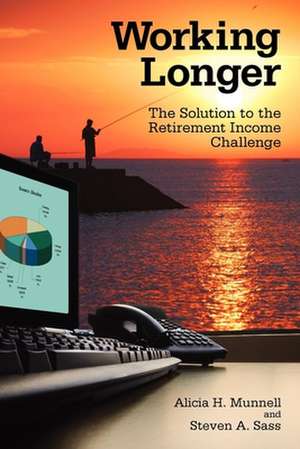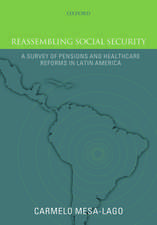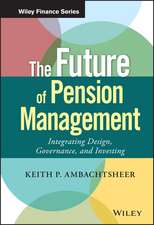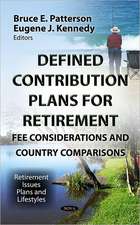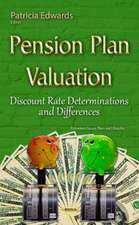Working Longer: The Solution to the Retirement Income Challenge
Autor Alicia H. Munnell, Steven A. Sassen Limba Engleză Paperback – 6 mai 2009
Daily headlines warn American workers that their retirement years may be far from golden. The main components of the retirement income system—Social Security and employer-provided pensions and health insurance—are in decline while the amount of income needed for a comfortable retirement continues to rise.
In Working Longer, Alicia Munnell and Steven Sass suggest a simple solution to this problem: postponing retirement by two to four years. By following their advice, the average worker retiring in 2030 can be as well off as today's retirees. Implementing this solution on a national scale, however, may not be simple.
Working Longer investigates the prospects for moving the average retirement age from 63, the current figure, to 66. Munnell and Sass ask whether future generations will be healthy enough to work beyond the current retirement age and whether older men and women want to work. They examine companies' incentives to employ older works and ask what government can do to promote continued participation in the workforce. Finally, they consider the challenge of ensuring a secure retirement for low-wage workers and those who are unable to continue to work.
The retirement system faces very real challenges. But together, workers, employers, and the government can keep this vital piece of the American dream alive.
In Working Longer, Alicia Munnell and Steven Sass suggest a simple solution to this problem: postponing retirement by two to four years. By following their advice, the average worker retiring in 2030 can be as well off as today's retirees. Implementing this solution on a national scale, however, may not be simple.
Working Longer investigates the prospects for moving the average retirement age from 63, the current figure, to 66. Munnell and Sass ask whether future generations will be healthy enough to work beyond the current retirement age and whether older men and women want to work. They examine companies' incentives to employ older works and ask what government can do to promote continued participation in the workforce. Finally, they consider the challenge of ensuring a secure retirement for low-wage workers and those who are unable to continue to work.
The retirement system faces very real challenges. But together, workers, employers, and the government can keep this vital piece of the American dream alive.
Preț: 213.11 lei
Nou
Puncte Express: 320
Preț estimativ în valută:
40.78€ • 42.34$ • 34.01£
40.78€ • 42.34$ • 34.01£
Carte tipărită la comandă
Livrare economică 24 martie-07 aprilie
Preluare comenzi: 021 569.72.76
Specificații
ISBN-13: 9780815703112
ISBN-10: 0815703112
Pagini: 207
Ilustrații: 1
Dimensiuni: 152 x 229 x 13 mm
Greutate: 0.33 kg
Editura: Brookings Institution Press
Colecția Brookings Institution Press
Locul publicării:United States
ISBN-10: 0815703112
Pagini: 207
Ilustrații: 1
Dimensiuni: 152 x 229 x 13 mm
Greutate: 0.33 kg
Editura: Brookings Institution Press
Colecția Brookings Institution Press
Locul publicării:United States
Notă biografică
Alicia H. Munnell is the Peter F. Drucker Professor of Management Sciences, Carroll School of Management, and director of the Center for Retirement Research at Boston College. She has served as assistant secretary of the Treasury for economic policy (1993–1995) and as a member of the President's Council of Economic Advisers (1995–97). She was also cofounder and first president of the National Academy of Social Insurance. Munnell has written or edited numerous books, including Coming up Short: The Challenge of 401(k) Plans, with Annika Sundén (Brookings, 2004).
Steven A. Sass is associate director of the Center for Retirement Research at Boston College. He was previously an economist at the Federal Reserve Bank of Boston and taught at Rutgers and Brandeis. His books include The Promise of Private Pensions: The First Hundred Years (Harvard, 1997), Social Security and the Stock Market: How the Pursuit of Market Magic Shapes the System, with Alicia H. Munnell (Upjohn Institute, 2006), and The Social Security Fix-It Book, with Alicia H. Munnell and Andrew Eschtruth (Center for Retirement Research, 2007).
Steven A. Sass is associate director of the Center for Retirement Research at Boston College. He was previously an economist at the Federal Reserve Bank of Boston and taught at Rutgers and Brandeis. His books include The Promise of Private Pensions: The First Hundred Years (Harvard, 1997), Social Security and the Stock Market: How the Pursuit of Market Magic Shapes the System, with Alicia H. Munnell (Upjohn Institute, 2006), and The Social Security Fix-It Book, with Alicia H. Munnell and Andrew Eschtruth (Center for Retirement Research, 2007).
Descriere
Daily headlines warn American workers that their retirement years may be far from golden. The main components of the retirement income system—Social Security and employer-provided pensions and health insurance—are in decline while the amount of income needed for a comfortable retirement continues to rise.
In Working Longer, Alicia Munnell and Steven Sass suggest a simple solution to this problem: postponing retirement by two to four years. By following their advice, the average worker retiring in 2030 can be as well off as today's retirees. Implementing this solution on a national scale, however, may not be simple.
Working Longer investigates the prospects for moving the average retirement age from 63, the current figure, to 66. Munnell and Sass ask whether future generations will be healthy enough to work beyond the current retirement age and whether older men and women want to work. They examine companies' incentives to employ older works and ask what government can do to promote continued participation in the workforce. Finally, they consider the challenge of ensuring a secure retirement for low-wage workers and those who are unable to continue to work.
The retirement system faces very real challenges. But together, workers, employers, and the government can keep this vital piece of the American dream alive.
In Working Longer, Alicia Munnell and Steven Sass suggest a simple solution to this problem: postponing retirement by two to four years. By following their advice, the average worker retiring in 2030 can be as well off as today's retirees. Implementing this solution on a national scale, however, may not be simple.
Working Longer investigates the prospects for moving the average retirement age from 63, the current figure, to 66. Munnell and Sass ask whether future generations will be healthy enough to work beyond the current retirement age and whether older men and women want to work. They examine companies' incentives to employ older works and ask what government can do to promote continued participation in the workforce. Finally, they consider the challenge of ensuring a secure retirement for low-wage workers and those who are unable to continue to work.
The retirement system faces very real challenges. But together, workers, employers, and the government can keep this vital piece of the American dream alive.
